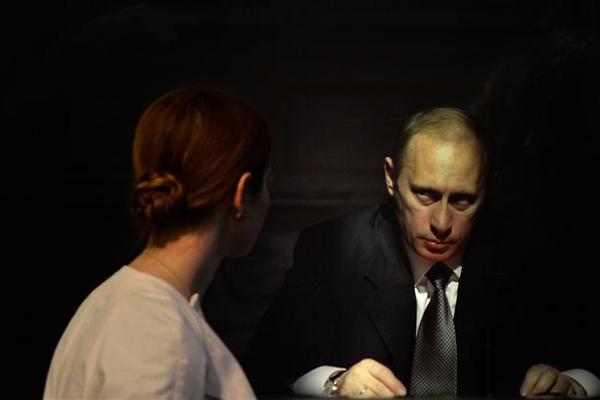Russian NGOs fear fresh crackdown after 'undesirable' law
MOSCOW - Agence France-Presse


A visitor looks at a photo showing Russia's President Vladimir Putin, displayed at personnel exhibition of Russia's photographer Sergei Maximishin in Moscow on May 14, 2015. AFP Photo
Already branded "foreign agents" while endeavouring to help abuse victims or protect the environment, Russian activists fear a new law against "undesirable" NGOs will further stymie their work.President Vladimir Putin over the weekend signed off on legislation that allows authorities to ban international NGOs seen as threatening "state security".
While the law -- which was condemned by the West and rights groups -- is aimed at foreign organisations, Russia's beleaguered civil society fears the draconian legislation will also leave it hamstrung.
"It will primarily hit Russian organisations and activists," Natalya Taubina of the Public Verdict group, which defends victims of abuse by police and security forces, told AFP.
Under the legislation, which allows Russia's prosecutor general powers to ban international organisations on vague security grounds, local activists who work with the "undesirables" face fines and up to six years in jail.
"We have partnerships with a number of international NGOs in the rights sphere," Taubina said.
If those partners were banned, "it's unlikely we will be able to fully carry out any of the programmes," she said.
Activists say the law continues a Kremlin crackdown on free speech that began after Putin's reelection as president in 2012 amid major protests.
Shortly after he began his third term, the authorities rushed through legislation branding Russian NGOs that receive foreign funding, and are seen as active in the politics, as "foreign agents".
Scores of Russian groups, including Public Verdict, have been slapped with the label, which was presented by Putin's supporters as necessary to prevent a Western-backed revolution.
Now activists fear being squeezed even further.
The new law is "the second half of the same thing," said Pavel Chikov, founder of Agora, an award-winning advocacy group that has defended cases such as that of Pussy Riot punk protest group.
"The law gives the possibility to ban absolutely any activity that is independent of Russia's authorities," said Chikov, whose organisation has also been labelled a "foreign agent".
The question is whether it will be used to cut ties with "all organisations, all foundations, all institutions that cooperate with Russian NGOs," he said.
Russian authorities have become increasingly isolationist since the toppling of Kremlin-backed president Viktor Yanukovych by pro-Western protestors in neighbouring Ukraine, sparking a crisis in East-West relations.
While Putin portrays the turmoil in Ukraine as a US-inspired plot against Russia, critics believe his corrupt elite is stirring up paranoia to cement its grip on the country's riches.
In the process Russia's civil society says the vital work it does is gradually being strangled.
"The situation is getting more difficult," said Chikov, who has spent 15 years working in human rights.
"Every human rights activist can be put in prison at any moment," he said.
From environmental activism to work defending religious freedom, NGOs fear the loosely-worded law could be used as a catch-all for foreign groups operating in Russia.
Victoria Arnold, a Moscow-based researcher with a news service that monitors religious freedom in the ex-Soviet republics, said it could potentially be used against religious groups.
"This law does not explicitly mention religious organisations and does not appear to be aimed at them, however, as 'non-governmental' organisations, they do fall under its scope and could therefore be affected," Arnold said, noting that a vaguely-worded 2002 law on "extremism" had been used against religious groups "on a regular basis."
Some organisations, such as Greenpeace Russia, preferred not to comment on the law.
Others said that while they were still waiting to see what impact the new law would have, the future did not bode well for civil society.
"It's hard to say now how it will be used," said Alexander Peredruk of Soldiers' Mothers of Saint Petersburg, a group that campaigns against rights abuses in the military.
"Laws like this aren't passed for nothing. It's obvious that there's some aim. And of course such laws do not show positive changes in our country."
